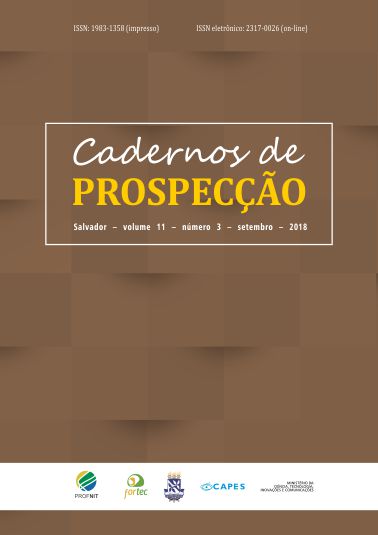A Study of the Conditions of the Estabilishment of a Science and Technological Park at Paranavaí’s Municipality
DOI:
https://doi.org/10.9771/cp.v11i3.27125Keywords:
Science Park, Innovation, Innovation Habitats.Abstract
Science parks are mechanism complex management, however capable of promoting economic development and, as such, perceive a gap in Brazil, orchestrating the still incipient habitats. In front of the context this study pretended building data which sustainment the adequacy of deployment, or not, of the science Park in the Paranavaí municipal. Like the methodological procedures, the principle produced a theoretical foundation on the technological systems and later a characterization of the region, object of the study. The methodology suggested by Zouain and Plonski was used as guide, restricting itself to one of the three stages of implantation of a technology park and to this one with a verification of the fulfillment of the requirements of implantation of a technological park, based on documentary searches on the Paranavaí municipal. Analyzes has identified there are some shortage relation customer service region of all aspects necessary for a Science Park deployment.
Downloads
References
AGÊNCIA BRASILEIRA DE DESENVOLVIMENTO INDUSTRIAL (ABDI). Estudos Setoriais de Inovação: Parques Tecnológicos no Brasil Estudo, Análise e Proposições. 2008. Disponível em: <http://www.abdi.com.br/Estudo/Parques%20Tecnol%C3%B3gicos%20-%20Estudo%20an%C3%A1lises%20e%20Proposi%C3%A7%C3%B5es.pdf>. Acesso em: 2 jun. 2018.
BRASIL. Ministério da Ciência, Tecnologia e Inovações e Comunicações (MCTI). Estudo de Projetos de Alta Complexidade: Indicadores de Parques Tecnológicos. Brasília: Centro de Apoio ao Desenvolvimento Tecnológico da Universidade de Brasília (CDT/UnB), 2013. Disponível em: <http://www.anprotec.org.br/Relata/PNI_FINAL_web.pdf>. Acesso em: 1º jun. 2018.
COELHO, Ana Maria Magni. Empreendedorismo inovador: como criar startups de tecnologia no Brasil. [S.l.]: Digitaliza Conteúdo, 2012.
DO AMARAL, Roberto Rogério; SARTORI, V.; CUNHA, CJC de A. Parques Tecnológicos: a Sinergia da Hélice Tríplice pela Visão Autopoiética. In: 3º CONGRESSO INTERNACIONAL DE CONHECIMENTO E INOVAÇÃO. Porto Alegre. 2013. p. 20-33. Anais... Porto Alegre. 2013. Disponível em: <http://www.egov.ufsc.br/portal/sites/default/files/artigo_complexidade__final_05072011_1600_hrs__postado_0.pdf>. Acesso em: 3 maio 2018.
EMPRESÔMETRO, Inteligência de Mercado. [2017]. Disponível em: <https://www.empresometro.com.br/home/estatisticas>. Acesso em: 10 out. 2017.
INSTITUTO PARANAENSE DE DESENVOLVIMENTO ECONÔMICO E SOCIAL (IPARDES). Caderno Estatístico Município de Paranavaí. [2017]. Disponível em: <http://www.ipardes.gov.br/cadernos/MontaCadPdf1.php?Municipio=87700>. Acesso em: 1º out. 2017.
LEMOS, M. B.; DINIZ, C. C. Projeto parque tecnológico de Belo Horizonte. Belo Horizonte: UFMG, 2004.
NOCE, Adriana Ferreira Soares. O processo de implantação e operacionalização de um parque tecnológico: um Estudo de Caso. 2002. 119 p. Dissertação (Mestrado) – Universidade Federal de Santa Catarina, Florianópolis, 2002. Disponível em: <https://repositorio.ufsc.br/xmlui/bitstream/handle/123456789/84338/187118.pdf?sequence=1&isAllowed=y> Acesso em; 2 maio 2018.
PARANAVAÍ (Município do Paraná). Lei n. 3.630, de 27 de julho de 2010.
RELAÇÃO ANUAL DE INFORMAÇÕES SOCIAIS (RAIS). [2017]. Disponível em: <http://www.rais.gov.br/sitio/index.jsf>. Acesso em: 4 out. 2017.
RESENDE, Raquel Mendonça do Vale. Metodologia para a implantação de PARQUELABS: o caso do Parque Tecnológico de Uberaba. 2016. 58 p. Dissertação (Mestrado) – Universidade Federal do Triangulo Mineiro, Uberaba, 2016.
SERVIÇO BRASILEIRO DE APOIO ÀS MICRO E PEQUENAS EMPRESAS (SEBRAE). Site. [2016]. Disponível em: <http://www.sebrae.com.br>. Acesso em: 2 set. 2017.
SPOLIDORO, Roberto; AUDY, Jorge. Parque científico e tecnológico da PUCRS: TECNOPUC. [S.l.]: Edipucrs, 2008.
STEINER, João E.; CASSIM, Marisa Barbar; ROBAZZI, Antonio Carlos. Parques tecnológicos: ambientes de inovação. Revista IEA. USP, São Paulo, 2008. Disponível em: <http://www.unilago.com.br/download/arquivos/21016/__Steiner_PT_ambientes_inovacao.pdf>. Acesso em: 2 jun. 2018.
TEIXEIRA, C. S.; SANTOS, G. S. P.; MORÉ, R. P. O. Personalidade jurídica de parques brasileiros. In: CONFERÊNCIA ANPROTEC DE EMPREENDEDORISMO E AMBIENTES DE INOVAÇÃO, 25, 2015, Florianópolis. Anais... Florianópolis: ANPROTEC, 2015. 21 p. Disponível em: <http://via.ufsc.br/wp-ontent/uploads/2017/12/revistaVIA-2ed.pdf>. Acesso em: jun. 2018.
VENTURA, Magda Maria. O estudo de caso como modalidade de pesquisa. Revista SoCERJ, [S.l.], v. 20, n. 5, p. 383-386, 2007. Disponível em: <https://s3.amazonaws.com/academia.edu.documents/34829418/o_estudo_de_caso_como_modalidade_de_pesquisa.pdf?AWSAccessKeyId=AKIAIWOWYYGZ2Y53UL3A&Expires=1528782728&Signature=C5LeqRWMTCA5AE4GmCIHy%2B5pCXc%3D&response-content-disposition=inline%3B%20filename%3Dsetembro_outubro_O_Estudo_de_Caso_como_M.pdf>. Acesso em: jun. 2018.
ZOUAIN, Desirée Moraes; PLONSKI, Guilherme Ary. Parques Tecnológicos: planejamento e gestão. [S.l.]: Anprotec, 2006.
Downloads
Published
How to Cite
Issue
Section
License
Copyright (c) 2018 Cadernos de Prospecção

This work is licensed under a Creative Commons Attribution-NonCommercial 4.0 International License.
O autor declara que: - Todos os autores foram nomeados. - Está submetendo o manuscrito com o consentimento dos outros autores. - Caso o trabalho submetido tiver sido contratado por algum empregador, tem o consentimento do referido empregador. - Os autores estão cientes de que é condição de publicação que os manuscritos submetidos a esta revista não tenham sido publicados anteriormente e não sejam submetidos ou publicados simultaneamente em outro periódico sem prévia autorização do Conselho Editorial. - Os autores concordam que o seu artigo ou parte dele possa ser distribuído e/ou reproduzido por qualquer forma, incluindo traduções, desde que sejam citados de modo completo esta revista e os autores do manuscrito. - Revista Cadernos de Prospecção está licenciado com uma Licença Creative Commons Attribution 4.0. Esta licença permite que outros remixem, adaptem e criem a partir do seu trabalho para fins não comerciais, e embora os novos trabalhos tenham de lhe atribuir o devido crédito e não possam ser usados para fins comerciais, os usuários não têm de licenciar esses trabalhos derivados sob os mesmos termos.
Este obra está licenciado com uma Licença Creative Commons Atribuição 4.0 Internacional.





